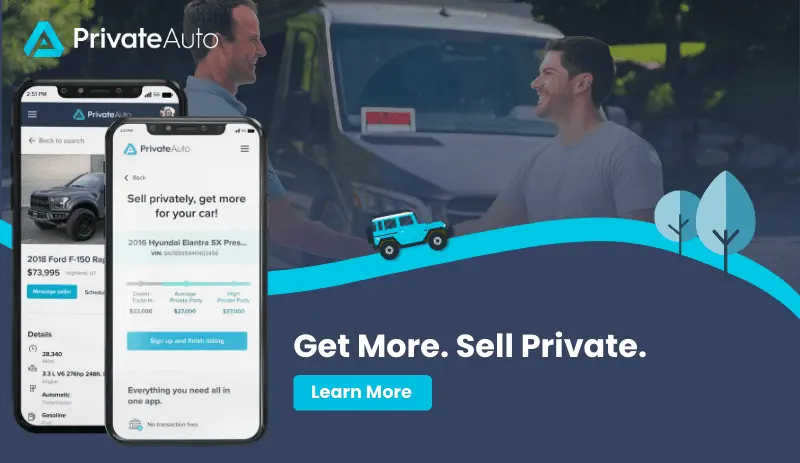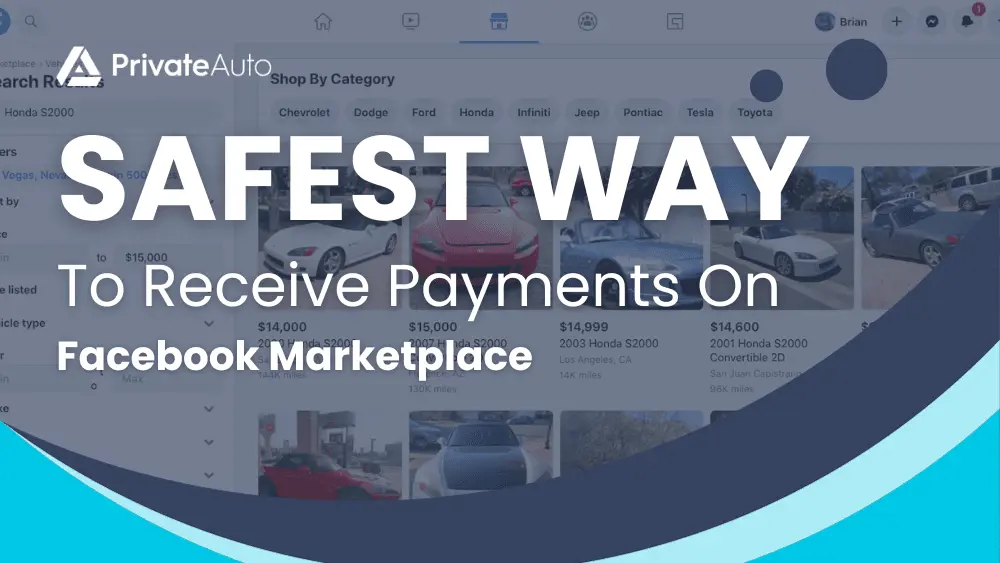While Facebook Marketplace gets your vehicle seen by a lot of potential buyers, it doesn’t do much to help you get the deal done. We created PrivateAuto Pay to protect you against the fraudsters that abound on Facebook Marketplace and other listing sites—and to make vehicle transactions smooth, convenient, and fast.
What are my payment options?
What are My Payment Options on Facebook Marketplace?
Facebook Marketplace is great for getting a lot of eyeballs on your listing, but it doesn’t have much transactional infrastructure. Listings sites, such as Facebook Marketplace and Craigslist, function as “meetingplaces” to connect a buyer to a seller—and then leave them in the lurch to negotiate issues such as payments, document signing, and the rest.
Here are your payment options when selling your car on Facebook Marketplace. None of them are very good.
- Meta Pay
- Cash
- Bank transfer
- Check
- Peer-to-peer payment apps
The first of these, Meta Pay, integrates fairly seamlessly into Facebook Marketplace’s user interface but is inadequate for large purchases.
Cash, bank wire, checks, and third-party apps like Venmo each have their drawbacks—and Marketplace offers no support for them. You and the buyer will need to navigate payment on your own, outside of Facebook.
Then there’s PrivateAuto Pay. It’s so easy and intuitive, you’ll wonder where it’s been all your life.

Is Meta Pay any good?
Is Meta Pay Any Good?
Facebook released its built-in digital wallet, Facebook Pay, in 2020, then rebranded it to Meta Pay in 2022.
Meta Pay sits in the middle to facilitate transfers between buyer and seller by connecting to their existing accounts (credit cards, bank accounts, PayPal accounts, etc).
For a buyer:
1. The buyer connects their outside funding source, such as a bank account, credit card, or PayPal account, to their Meta Pay wallet.
2. When they need to pay a seller, the buyer transfers money from their connected funding source into their Meta Pay wallet first.
3. The buyer initiates a payment to the seller through Meta Pay, drawing from the balance in their digital wallet.
For a seller:
1. The seller links their own external bank account to their Meta Pay wallet.
2. When a buyer sends them money through Meta Pay, it deposits into the seller’s Meta Pay account balance.
3. The seller can then transfer the money out from their Meta Pay wallet to their regular bank account.
This sounds an awfully lot like how PrivateAuto Pay works. Until we get into Meta Pay’s restrictions—restrictions that PrivateAuto Pay doesn’t have.
Meta Pay is great for small transactions conducted on Facebook and its subsidiary apps.
For a large purchase such as a vehicle, it’s not so great.
Meta Pay’s low transaction limits ($2,000 per 30 days for unverified accounts; $10,000 per 30 days for verified accounts) may be great for selling a couch, but they just won’t cut it for that lightly-used F-150 you’re trying to sell.
It’s a good thing there’s a better way. PrivateAuto Pay lets you instantly receive up to $1M with no transfer fees.
Risks of cash payments
Is Cash a Good Form of Payment?
Physical cash can be a bit sketchy, especially where large sums are involved.
Here are some drawbacks to receiving a physical cash payment:
- Trust: do you really know the person you’re dealing with? How do you know they’re not going to attack you and take back their cash as soon as you’ve transferred the title and handed them the keys?
- Counterfeit cash: while counterfeiting is rare, do you know for sure that the bills are genuine?
- Counting bills: do you enjoy counting out stacks of bills under the watchful eye of a stranger?
- Paperwork: do you know how to do the bill of sale and title transfer for your state? Will you have a record of the transaction in case the other party wants to contest it?
PrivateAuto Pay allows you to pay cash—digitally. All the benefits of physical cash, none of the drawbacks.
Is a Bank Transfer Good?
Bank wire transfers are painfully inconvenient for getting paid for your car.
1. Slow. Transfers can take days to fully process due to low account limits. If you’re smart, you won’t hand over the title until you’ve received the funds into your account. This forces the buyer to pay you, then wait—an act of faith on their part. It also turns what could be a quick transaction into a drawn-out affair.
2. Inconvenient. You and the buyer need to have multiple back-and-forth exchanges over a prolonged period of time to get you paid. You’ve got better things to do with your time and attention.
3. Potentially risky. Exposing your bank account details opens the door to fraud. It’s just not necessary to give out your banking info.
PrivateAuto Pay enables instant transfers between verified user accounts 24/7 with no limits or transfer fees. Encrypted data keeps your information secure. You get escrow-like safeguards in the palm of your hand, and the PrivateAuto dealflow keeps both you and the buyer protected.
Risks of checks
How About Checks?
If you’re smart, you won’t even think of accepting a personal check unless you wait for it to clear—and who wants to deal with that delay?
Cashier’s checks are more trustworthy, but even they can be forged. The only way for you to be absolutely certain a cashier’s check is good: meet the buyer at their bank and have the bank verify the funds.
If you want to skip the inconvenience (and the limited banker’s hours), welcome to PrivateAuto Pay.
Risks of Venmo or Paypal
What About Venmo or Paypal?
Peer-to-peer payment apps like Venmo and PayPal seem convenient, but they have transfer limits, fees, or both.
- Low sending limits are unsuitable for high dollar transactions—Venmo has a $5K limit and PayPal has a $10K limit on personal accounts.
- PayPal’s fees of 2-3% quickly add up on large payments, so most buyers won’t even consider it.
While peer-to-peer apps work great for splitting bills, they fall woefully short as payment methods for a Land Rover Defender. For a secure car payment solution with ironclad protections, choose PrivateAuto Pay.
What is PrivateAuto Pay?
What is PrivateAuto Pay?
PrivateAuto is PrivateAuto’s built-in banking integration that enables instant, secure, and fee-free funds transfers up to $1M. It’s a dream come true for car sellers.
- Your PrivateAuto Pay account is actually a bank account that you own, accessed via your PrivateAuto profile.
- Easily move money between your PrivateAuto Pay account and your external bank account via a balance transfer.
- Receive up to $1 million instantly from the seller into your PrivateAuto Pay account.
- Instant payments arrive any time of day, every day of the year.
- No exchange of contact information or banking info.
- Encrypted info protects your data from hackers.
- Conclude the entire transaction when you meet the buyer for a test drive.
- Sell a car to a remote buyer and forgo costly and inconvenient escrow services.
OK, so PrivateAuto Pay is great and all, but it’s a service for users of PrivateAuto’s transactional marketplace. How does that help you if you’re selling a car on Facebook Marketplace?
Enter the DealNow fast-track solution, created to give you access to PrivateAuto’s extraordinary transaction capabilities. Even if—especially if—you’re not selling your car on PrivateAuto.
What is DealNow
DealNow Is the Answer
PrivateAuto is an end-to-end solution that allows you to list your vehicle for sale, do the deal, and get paid. But we understand that sellers may be listing their car for sale on other sites such as Facebook Marketplace.
That’s why DealNow was created. You get to skip the listing process and go straight to closing the transaction with the power of instant transaction tech. Here’s how it works:
1. Invite the buyer to DealNow via a custom link.
2. Enjoy identity verification, in-app messaging, and a test drive scheduling feature (none of which require you to exchange contact info).
3. Meet the buyer and let the buyer drive your car.
4. You and the buyer go together through a step-by-step transaction process in which you each confirm relevant details right in DealNow. From mileage to the VIN to the condition of the vehicle, we help you both prevent any errors.
5. You and the buyer each electronically sign an official bill of sale. This is stored in your DealNow account as a legal record you can refer to down the road.
6. The buyer is prompted to initiate payment.
7. You get a notification of funds received and confirm receipt of payment.
8. You sign over the car title and hand over the keys.
DealNow is so smooth, so safe, and so fast that you’ll never want to sell a car without it. No matter where you find your buyer—from eBay motors to Autotrader to the friend of a friend—DealNow will help you get the deal done and get paid, right now.
Would You Like to Sell Your Car on PrivateAuto?
If you’d like to sell your car on PrivateAuto, you’re certainly welcome to. Here’s how the PrivateAuto selling process works:
1. You register on PrivateAuto and we verify you.
2. You list your car with our easy, step-by-step guided process.
3. You set your pricing and terms and screen would-be buyers.
4. You vet incoming offers and choose a buyer.
5. You meet the buyer for a test drive.
6. You and the buyer e-sign documents from your PrivateAuto mobile app.
7. You get paid instantly.
So easy.

Looking to buy a car? Shop used cars for sale by owner and find the ride of your dreams today!
Payments FAQ
Is PrivateAuto safe?
PrivateAuto is the safest vehicle-selling platform available. In addition to allowing you to communicate with vehicle buyers without sharing your contact information, PrivateAuto offers fraud prevention features, including driver’s license verification and selfie verification.
What is the best site for private car sales?
PrivateAuto offers more features than any other vehicle-selling platform, which makes it the best website for private car sales. You’d be pressed to find another platform that allows you to sell a vehicle as quickly and securely as PrivateAuto.
For more information, take a look at how PrivateAuto stacks up against competitors.
Is it a good idea to buy a car on Facebook Marketplace?
You can find a wide selection of cars for sale on Facebook Marketplace, but the platform doesn’t give you any support for getting the transaction done.
That’s why we created DealNow. Simply invite the seller to DealNow and enjoy PrivateAuto’s unprecedented security, convenience, and payment infrastructure.
How do I accept a payment on Facebook Marketplace for a car?
On Facebook Marketplace, buyer and seller are left to their own devices to figure out how to get the funds from one to the other.
PrivateAuto’s fast-track DealNow allows you to use our transactional and payment infrastructure to get the deal done, even if you originally met the buyer on Facebook Marketplace.
DealNow uses PrivateAuto Pay, our groundbreaking payment integration, to transfer up to $1M instantly with no transaction fees.
How do you know if a car is legit on Facebook Marketplace?
Determining the legitimacy of a car on Facebook Marketplace can be challenging due to the lack of a standard verification process. PrivateAuto verifies sellers and includes a vehicle history report with listings, providing peace of mind for buyers.
How to protect yourself when selling a car privately?
To protect yourself when selling a car privately, we recommend the following practices:
1. Don’t give out your contact information
2. Verify that the buyer has the funds to purchase the vehicle
3. Deal with verified buyers only
4. Receive payment through PrivateAuto Pay
How does PrivateAuto vet buyers and sellers?
Both buyers and sellers get verified using the latest facial recognition technology to create a safe experience. Buyers must provide drivers license information, an email address, and a phone number. This personal information is hidden from other buyers and sellers and is only used to verify the user’s identity.
Sellers must enter the VIN for the vehicle and create a profile before listing. A VIN is critical to investigating the ownership of a vehicle and determining whether the title is clean. Buyers and sellers can enjoy peace of mind on PrivateAuto knowing that both parties have been verified.
Does PrivateAuto provide the necessary paperwork for a successful transfer of ownership?
PrivateAuto has all the paperwork you need to buy a car in any state. Each state requires different paperwork to legally buy a car and transfer the title. Many states require a bill of sale. Some states have their own specific forms that are required to buy or sell a vehicle in the state.
PrivateAuto manages all these forms and makes them available for both buyers and sellers to electronically sign.

Landon Epperly
Contributing Author
Landon Epperly is the Product Manager at PrivateAuto, where he thrives on turning innovative ideas into reality. With a deep passion for cars and boats, Landon combines his love for vehicles with his expertise in product development to enhance the online marketplace experience….
